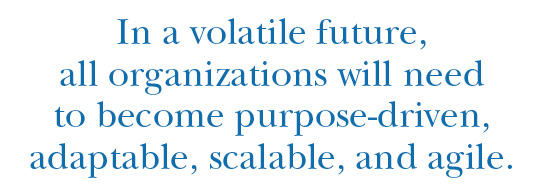By Salim Ismail

Today we see an explosion of a new organizational configuration called Exponential Organizations (or ExOs). This new form of organization is intensely focused on producing a disproportionately large impact—at least 10 times larger than its peers—through innovative and disruptive techniques that leverage accelerating technologies.
It’s not about doing what we already do better, faster, or cheaper. Instead, it is about leveraging information and technology to provide the ability to build fundamentally different businesses.
While traditional business models work just fine in a scarcity-based environment, they fail to enable success in the Fourth Industrial Revolution. The unprecedented pace and scale of transformation we’re experiencing today are unlike anything humankind has ever seen. Scores of technological advances are happening simultaneously while also building on one other.
In “The Six Ds of Exponentials,” Peter Diamandis, who cofounded Singularity University, says that anything that becomes digitized enters the same exponential growth we see in computing. Digital information is easy to access, share, and distribute. It can spread at the speed of the internet. Once something can be represented in ones and zeros—from music to biotechnology—it becomes an information-based technology that is capable of exponential growth.
Common ExO Capabilities
Researchers have identified the capabilities that
are common among companies that grow at an exponential clip:
- ExOs benefit from five capabilities that map to the acronym SCALE (staff-on-demand, community and crowd, algorithms, leveraged assets, and engagement).
- ExOs benefit from five internal capabilities that map to the acronym IDEAS (interfaces, dashboards, experimentation, autonomy, and social).
- Every ExO declares a massive transformative purpose (MTP): a vast and audacious statement of purpose that captures why the organization exists.
The MTP is more than a mission statement. It doesn’t focus on what’s possible today; it’s aspirational, designed to help us realize a different future. The MTP fuels enthusiasm and engages people’s hearts and minds to work together to accomplish the goal. For example, Google’s MTP is to “organize the world’s information and make it universally accessible and useful.”
ExOs are more capable than their competitors because they take advantage of accelerating technologies like artificial intelligence, 3D printing, automation, sensors, blockchain, and the Internet of Things. (We have about a dozen technologies all growing exponentially and simultaneously today.) Good examples of ExOs include TED (leveraging community), YouTube (peer-to-peer online video), Airbnb (leveraging others’ assets), and Tesla (a computer with wheels).
A big difference between these new organizational configurations and traditional business is that ExOs are information-enabled. Organizations that have full command of their information and are capable of leveraging computation power can scale infinitely.
Three Forms of Information Enablement
Information enablement has three forms.
- Turning Traditional Functions from Analog to Digital
Tesla found that after a test drive, Americans weren’t buying the car because it wouldn’t crawl forward when drivers lifted their foot off the brake, as would happen in vehicles with a standard automatic transmission. So they programmed the car to do that, and the next day, 10,000 Teslas crawled forward from a standing start. Here, a traditional, mechanical function is now information-enabled to be 100% software and information driven.
- Leveraging and Harnessing Information Streams
Rolls Royce used to sell jet airplane engines, then they decided to lease them. They then rented them by the hour. Today, the company gathers the jet engine sensors’ data and sells routing and altitude recommendations back to the airlines. This remarkable transformation turned a manufacturer of physical products made of atoms into a purveyor of new products made of digital bits and bytes.
- Harnessing Information at Scale
Tesla’s in-car user manual adapts and personalizes its content for drivers based on the vehicle’s features and extras. They created capabilities that allow them to put the information and data they produce to work for them, as needed and at scale.
Where Can You Learn More about Exponential Growth?
A thriving 7,500-person community of ExO advisors and consultants is available at www.OpenExO.com to guide traditional companies to exponential growth.
Most remarkable is a process framework called an ExO Sprint that leapfrogs leadership, culture, and management thinking three years ahead in just 10 weeks and breaks the organizational immune system that fights new ideas. Hundreds of companies have successfully implemented that framework, including Procter & Gamble, TD Ameritrade, HP, Visa, and Vodacom.
Many business, government, and educational organizations adopt the exponential growth model to help them fend off innovative would-be competitors. Established market leaders work to protect themselves from disruptive competitors by building capabilities that are difficult to replicate and rely on accelerating technologies.
In the past, optimizing for efficiency, predictability, and linear growth was the focus of many organizations. In a volatile future, all organizations will need to become purpose-driven, adaptable, scalable, and agile.
Technical writers have the opportunity to guide their organizations in this direction and lead the charge for information-enabled organizations.
As a professional technical communicator, you are in an excellent position to help the organizations you serve to develop capabilities around information (findability, interoperability, scalability, deliverability, translatability). Remember, when asking your leaders for financial investments and other resources, make sure to focus on selling the value of the innovative, scalable information-development capabilities you are proposing. The value of a capability is the measurable results it can provide the organization.
The expertise of technical writers is essential to the development of information-enabled organizations that aim to leverage ExO-style capabilities for growth. Operationalizing content production and developing content management capabilities that are scalable, automatable, and difficult to duplicate are crucial components of any exponential growth plan.
Salim Ismail (salim@openexo.com) is a Canadian serial entrepreneur, angel investor, author, speaker, and technology strategist. He has been building disruptive digital companies since the early 2000s. The Co-Founder & Chairman of ExO Works, Ismail is an award-winning strategist and entrepreneur who has gained global recognition for his work addressing exponential technologies and disruptive innovation. Previously he was the founding executive director of Singularity University, VP at Yahoo tasked with building their Brickhouse internal incubator, and founder of multiple startups including Angstro (acquired by Google in 2010). A prolific speaker, Salim gives more than 150 talks a year to audiences of all sizes around the world, including a keynote at the G20 Summit. He has been profiled in theNew York Times, Bloomberg BusinessWeek, Fortune, Forbes, WIRED, Vogue, and on the BBC. He is the principal author of best-selling, international, business books Exponential Organizations and Exponential Transformation.
References
Berman, Alison E. 2016. “The Motivating Power of Massive Transformative Purpose.” SingularityHub. Accessed 19 January 2021. https://singularityhub.com/2016/11/08/the-motivating-power-of-a-massive-transformative-purpose/.
Diamandis, Peter. 2020. “The Six Ds of Exponentials.” 28 October 2020. https://www.diamandis.com/blog/6-ds-exponentials.
ExO Works. 2017. “The Breakdown of the 10 Week ExO Sprint.” Accessed 19 January 2021. https://youtu.be/qY7wFJw0H0c.
Ismail, Salim. n.d. “Is Your Corporate Immune System Killing Innovation and Hindering Growth?” Accessed 19 January 2021. https://blog.growthinstitute.com/exo/corporate-immune-system.
OpenExO. n.d. Accessed 19 January 2021. https://www.openexo.com/.
Saenz, Aaron. 2010. “Salim Ismail: How Will Accelerating Technologies Affect You? (video).” SingularityHub. Published 23 September 2010. https://singularityhub.com/2010/09/23/salim-ismail-how-will-accelerating-technologies-affect-you-video/.
Singularity University. n.d. Accessed 19 January 2021. https://su.org/.
World Economic Forum. 2016. “What is the Fourth Industrial Revolution?” YouTube, 18 July 2016. https://www.youtube.com/watch?v=kpW9JcWxKq0.



